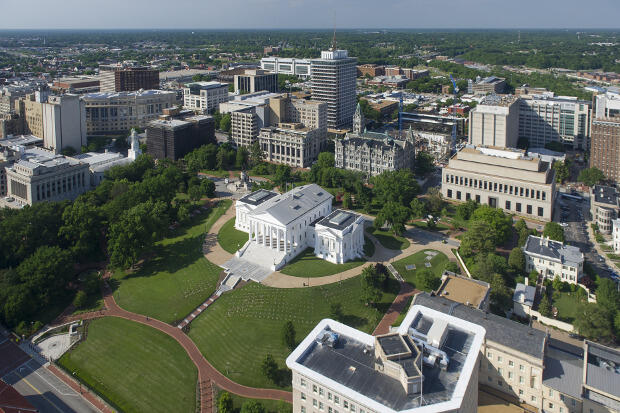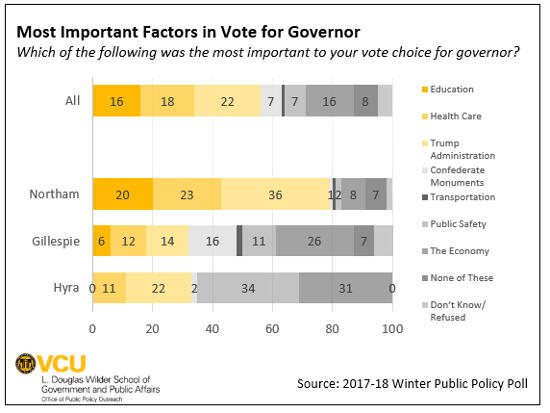
Jan. 5, 2018
More Virginia voters pulled lever in response to Trump administration than Confederate monuments
Share this story
CONTACT: Robyn McDougle, Ph.D.
Faculty Director, Office of Public Policy Outreach
Phone: (804) 827-3290
Email: rdmcdougle@vcu.edu
Farrah Stone Graham, Ph.D.
Survey Director
Phone: (804) 305-3447
Email: stonefn@vcu.edu
More than one in five voters in Virginia’s recent gubernatorial election say they made their decision in response to the Trump administration, according to a new poll by the L. Douglas Wilder School of Government and Public Affairs at Virginia Commonwealth University.
Offered a range of seven issue areas, a 22 percent plurality of those who reported casting ballots in November said the most important factor driving their vote was responding to the Trump administration, according to the Winter 2017-18 Public Policy Poll conducted by the Wilder School’s Office of Public Policy Outreach.
Close in importance to sending a message to the Trump administration were the areas of health care (18 percent), education (16 percent) and the economy (16 percent). Only a small portion of voters (7 percent overall and 17 percent of Republicans) saw Confederate monuments as the most important issue in their vote for governor. Public safety was the most important issue for 7 percent, while transportation was selected by only 1 percent.
“Monuments were a memorable point of debate among the candidates in the 2017 gubernatorial election,” said Robyn McDougle, Ph.D., director of the Wilder School’s Office of Public Policy Outreach, “but these results suggest voters were focused on national politics and bread-and-butter policy areas of health care, education and the economy.”

The poll also provides insight into priority differences between those who voted for Governor-elect Ralph Northam, a Democrat, versus those who voted for Republican Ed Gillespie or Libertarian Cliff Hyra.
Thirty-six percent of those who reported voting for Northam said responding to the Trump administration was their most important factor in voting, compared to 14 percent of those who reported voting for Gillespie and 22 percent who reported voting for Hyra.
Significant regional differences also existed. Health care was named as the most important factor by 32 percent of Northern Virginia residents, compared to only 9 percent of Tidewater-area residents and 8 percent of those in the Northwest. Education was cited as the most important factor by 21 percent of those in the South Central and Tidewater regions, compared to 8 percent who said the same in the West region.
By contrast, the economy was most important for 25 percent of Northwest residents and 21 percent of those in the West region while only 13 percent said the same in the South Central and Tidewater regions.
Poll results also showed clear differences on priority issues along gender and racial lines:
- 27 percent of women said responding to the Trump administration was the most important factor in their vote for governor, compared to 15 percent for men; also 24 percent of women named education as their key issue, compared to 7 percent of men.
- White respondents (19 percent) were significantly more likely to list the economy as a primary factor than were minority respondents (9 percent), while education was more frequently a key factor for minority respondents (31 percent) compared to white respondents (9 percent).
- 36 percent of those who reported voting for Northam said responding to the Trump administration was their most important factor in voting, compared to 14 percent of those who reported voting for Gillespie and 22 percent who reported voting for Libertarian Cliff Hyra who said the same. Among those reporting a vote for Gillespie, 26 percent said the economy and 16 percent said Confederate monuments were a crucial factor, compared to 8 percent and 1 percent, respectively, of Northam voters.
The Public Policy Poll was conducted by landline and cell telephone from Dec. 8-26, 2017, with a random sample of 788 adults in Virginia. Results reported in this release are based on a sub-sample of those who reported voting in the 2017 election, providing a margin of error of +/- 4.83 for Q6b and +/- 4.24 for Q7. For a PDF of the 11-page report including complete question wording and detailed tables of results, go to http://wilder.vcu.edu/office-of-public-policy-outreach/
On Tuesday, January 9, the Wilder School’s Office of Public Policy will release further poll results about preferred courses of action for Confederate monuments. A Jan. 16 release will cover issues of public safety, economic development, and K-12 and higher education.
Subscribe to VCU News
Subscribe to VCU News at newsletter.vcu.edu and receive a selection of stories, videos, photos, news clips and event listings in your inbox.









